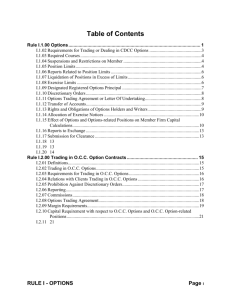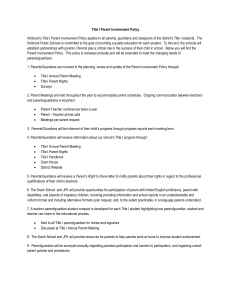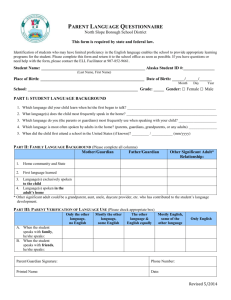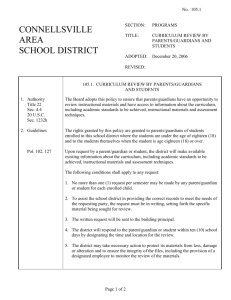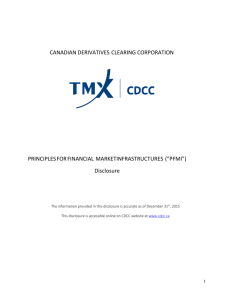Campus Day Care Curriculum Statement
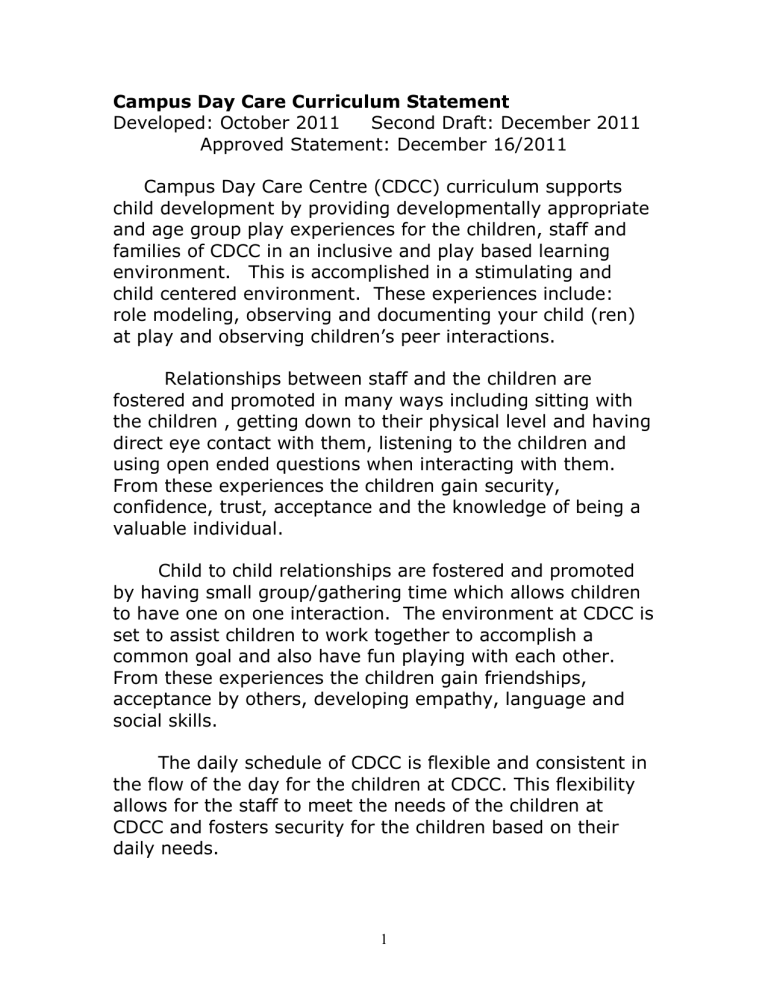
Campus Day Care Curriculum Statement
Developed: October 2011 Second Draft: December 2011
Approved Statement: December 16/2011
Campus Day Care Centre (CDCC) curriculum supports child development by providing developmentally appropriate and age group play experiences for the children, staff and families of CDCC in an inclusive and play based learning environment. This is accomplished in a stimulating and child centered environment. These experiences include: role modeling, observing and documenting your child (ren) at play and observing children’s peer interactions.
Relationships between staff and the children are fostered and promoted in many ways including sitting with the children , getting down to their physical level and having direct eye contact with them, listening to the children and using open ended questions when interacting with them.
From these experiences the children gain security, confidence, trust, acceptance and the knowledge of being a valuable individual.
Child to child relationships are fostered and promoted by having small group/gathering time which allows children to have one on one interaction. The environment at CDCC is set to assist children to work together to accomplish a common goal and also have fun playing with each other.
From these experiences the children gain friendships, acceptance by others, developing empathy, language and social skills.
The daily schedule of CDCC is flexible and consistent in the flow of the day for the children at CDCC. This flexibility allows for the staff to meet the needs of the children at
CDCC and fosters security for the children based on their daily needs.
1
By observing and documenting the staff use teachable moments (definition: an unplanned opportunity that arises in the daycare which leads to an activity), whenever possible with the children of CDCC. The documentation the staff completes is posted by each room’s parent board and the activities are planned based on the observations. The staff implements learning experiences for the children based on these observations and their interactions with the children.
CDCC has a variety of learning centers including: sand, water, dramatic play, blocks, creative art area and science.
For example the dramatic play area has household items, dress up clothing, table, chairs, food items, couches, etc.
These items allow the children access to materials that foster their imagination, problem solving, cooperation, basic concepts (i.e. colors, numbers, shapes, etc.). The areas are changed on a regular schedule or as the children’s interests change. By observing and interacting with the children this allows the staff to act on spontaneous experiences. The areas which are noisy are located close to each other and the quiet areas are also close to each other.
The staff are active participants in the children’s daily play experiences. The staff listen to the wants and needs of the children of CDCC and based on this they provide supplies, (i.e. markers, paints, cars, blocks, etc.) activity centers (i.e. drama, art, science, water, etc.), new experiences and hands on activities (i.e. movement, drama, art, science, etc.) for the children.
The multicultural diversity of CDCC is fostered and celebrated in our daily program by educating the staff, children and families in a non-judgmental, open and sharing environment. We have parents/guardians talk to the staff and children about their culture and what it means to them, parents/guardians are encouraged to come and take part in our daily program as volunteers, story tellers, sharing their unique skills,(i.e. music, cooking, sharing artifacts from their
2
homeland,) etc. CDCC has a yearly Family Barbecue which gives our families and staff an opportunity to interact with each other in a casual environment. At CDCC we focus on the uniqueness of each person/family of CDCC. By educating ourselves we show respect for the families and children in our care. We celebrate a variety of celebrations, during the year, based on the families we are involved with
(i.e. Ramadan, Christmas, Chanukah, Folklarama, etc.) in our daily programming. Daily snack items, equipment accessible to the children and activities provided reflect the multicultural diversity of CDCC. The multicultural diversity of the community of CDCC involves going on walks and exploring the Fort Garry Campus, field trips off of the Fort
Garry Campus, having visitors or guests coming and sharing their cultural experiences with us.
On a daily basis staff guide, interact and role model appropriate behaviors for each other and the children and families of CDCC in a positive and respectful manner. The staff greets the parent/guardian when the child is brought to
CDCC and when they are leaving CDCC. Staff share with and dialogue with the parent/guardian experiences their child has had through the day. Staff will dialogue with the parent/guardian about each child and their individual development in the 4 domains (physical, emotional, social and cognitive).
A whiteboard with daily experiences are hung in each room for the parent/guardian to read and this initiates dialogue between staff and the parent/guardian. CDCC has a monthly online newsletter which the parent/guardian may access to be informed about the events happening at CDCC.
Two parent/guardian bulletin boards are located in CDCC.
These bulletin boards are used for informing parent/guardians about recalls, community events, health news, current events and printed media materials. We value and respect parental and family input and we encourage family members to participate in the daily program of CDCC.
3
The staff of CDCC uses a variety of strategies and techniques to foster the development of all children and their families at CDCC. These include: listening to what the children are interested in, observing the children while at play, interacting with family members and assisting them as the staff are able, sharing ideas with their co-workers, using directly guided activities/experiences which the children may choose to participate in and staff attending professional development opportunities (i.e. workshops, conferences, etc.) as they are made available to them.
At CDCC the evaluation of the effectiveness of the program is done by observing the children and how they are responding to what is being offered to them on a daily basis.
The staff asks for and receives feedback from both the children and the parents/guardians of children attending
CDCC. The staff observes the children’s daily behavior to see how they are reacting and coping with changes to changes in the program. By observing the children and interacting daily with parents/guardians the effectiveness of
CDCC will be determined.
The general mood and positive atmosphere of CDCC is an indicator of the effectiveness of CDCC and the program, staff, children, families and community.
4


